SWORDS AND SOURCE-ERY - THE UNMADE HIGHLANDER V
A couple of years before the adaptation of 'Hellboy' Peter Briggs co-wrote with director Guillermo del Toro hit the screens, Briggs was ready to ignore the conventional wisdom that 'There Can Be Only One' and take a stab at reviving a struggling franchise.
The 1986 film 'Highlander' recounted the tale of Scottish Immortal Connor McLeod (played by a not-particularly Scottish Christopher Lambert), mentored by legendary Spanish Immortal Juan Ramirez (played by an also not-at-all Spanish Sean Connery), who must face off against the villainous Kurgan (played by a very-villainous Clancy Brown) to win 'The Prize' - a power beyond imagining. To the surprise of many, it became something of a hit. Yet, later attempts to turn the seemingly self-contained story into a franchise (via a sequel that inexplicably retconned the Immortals into aliens from the planet Zeist; a second sequel that ignored its predecessor; a TV series that likewise missed the second film altogether and didn't mention the third, and a fourth film that tried to tie the TV series and the films together,) mostly failed to capture that initial lightning-in-a-bottle that director Russell Mulcahy and writer Gregory Widen managed to successful unleash on the world. It was a subject writer Peter Briggs knew well, having been around the franchise in some way, shape or form since the beginning.
"Back in 1984/85, when I was a kid with one foot in the film industry door, I found myself briefly working at a stills company near Tower Bridge, and only about 20 yards away from this newly-constructed but ramshackle film studio called Jacob Street Studios," Briggs said.
"One night, we were all curious as to why there was a helicopter flying around with a searchlight, plus all kinds of other peculiar comings-and-goings on our doorstep. I already had my ACTT union card as an assistant film cameraman at the time and was trying fruitlessly to crew-up on the few productions shooting in Britain. I used to religiously read a weekly trade magazine called Screen International, which had listings of all the current movies in production, and so I scanned the listings and saw that this guy Russell Mulcahy was filming something called 'Highlander', literally right across the road from me. I wrote to the production office, but nothing came of it. I don't even recall if they bothered replying to me! Flashforward a year and change to 1986, and I was at a midnight showing at the Odeon Marble Arch in London for the 'Aliens' opening day… and loving that franchise and anticipating I'd want to see it again immediately, I'd also bought tickets for the screening at the Odeon Leicester Square late the next afternoon. I was knocking around Soho the following morning with a whole bunch of hours to kill and wondering what to do and to my surprise - this was a Friday, and new movies opened on a Friday - I noticed that the then-Warner West End in Leicester Square was showing on Screen Two, which was their biggest screen...this thing called 'Highlander'. And I was, like, 'Oh my god, that's the thing that was shooting across the road from me!' Now, remember I knew nothing about 'Highlander' other than that Connery and Lambert - who I'd seen in 'Greystoke' - was in it, and it had been a bumpy shoot. So I walked right into what I think was the first public showing of 'Highlander' in the UK, and from that crane/wipe transition from the parking garage to medieval Scotland, was promptly blown away by it… even above and beyond 'Aliens', 'Highlander' was my favourite film of 86."
Some five years later - in which time 'Highlander' had been sequelised with the aforementioned disastrous results - Briggs had swapped a career as a cameraman to one as a screenwriter after the meteoric sale of his 'Alien vs Predator' spec screenplay to 20th Century Fox. As a result, he found himself on a conference call with Bill Panzer, one-half of the team who'd produced the Mulcahy film.
"Panzer-Davis and the production entity Gaumont in Paris approached me for the 'Highlander' TV show - maybe showrunning it, or writing several scripts for it… it was all a bit nebulous, and so Davis sent me over a copy of what they had in the form of a very rough series bible," Briggs said.
“Their bible was very, very vague and barebones; probably about 12 pages, and triple or maybe even quadruple spaced, and typed in a gigantic font. It was very clear that beyond maybe five or six capsule paragraphs that constituted episode notions, Panzer-Davis had no substantive ideas for actual series storylines… other than there was a character called Duncan MacLeod, and Connor was vaguely in the mix somewhere. I guess that they still thought that they were going to be getting Christopher Lambert for a weekly series at that point. I needed to spitball a lot of ideas very quickly, so I got my brother Andrew on board because I always think that you can improve when you are in a collaborative pair. It's great to have a sounding board: even if someone generates a bad idea, it sparks a better one. He and I struggled for many months. We fleshed out the bare bones of their series bible and tried to define what the shape of the series would be for its first and second years, should that first season be a success. One of the things we hit upon was a thing we called "the Mortal Cult", who were characters who would have been human and watching the Immortals as they went down the centuries. We decided that this would be teased at the end of Season One and then come into the fore and be developed more throughout Season Two. We created so much material; we had something like 20 or more plots for the show. Some were thumbnails, but several were a number of pages long and were basically treatments. A handful of plots even went to about 16-plus pages in length, in-depth. Basically, we'd charted the direction the series was going in. So my agents Jane Anakin and Steve Kenis, who was the head of William Morris in Britain, passed along the material to Panzer and Davis, and Bill Panzer had this very eccentric phonecall with me one day while I was in England and he was sitting by his pool in LA, where he said 'Thanks. We're not going to be using any of that.' After the amount of material we'd created, that took us both a little by surprise! I was irked, but I'd just been hired to write on the (Stallone) "Judge Dredd", so it didn't annoy me too much. I went away to do that and other things, while they went away and eventually made their series, and so I really didn't think anything more of it. Many moons passed, until one night when my brother phoned me in an apoplectic rage to ask me if I'd seen the 'Highlander' TV show. I told him I wasn't watching, and he said, 'Well, I suggest you do.' It was showing at some ungodly post-midnight hour on the British ITV networks. He'd been keeping careful logs on a weekly basis and, sure enough, a suspiciously-large amount of the storylines we originated for Panzer and Davis turned up in the show. Mostly wanting to try give my brother a credit - I think he was stacking shelves at a supermarket or something at this time - I approached my agent and told him they (Panzer and Davis) had plagiarised our material without our credit and we wanted recompense and some form of retroactive credit. But my agent had a strong working relationship with Gaumont and was uncomfortable about rocking the applecart over there, so nothing happened, and the situation all ultimately fizzled. I guess it taught me a lesson about also having a strong lawyer on your team."
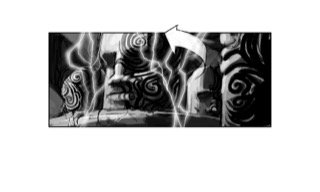
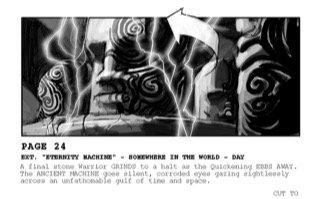
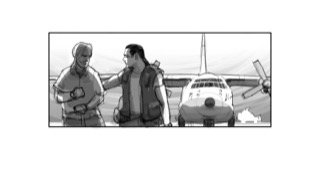
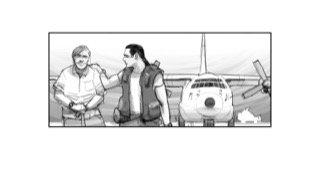
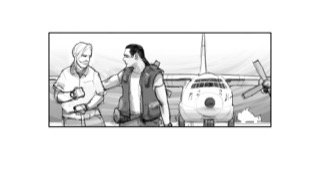
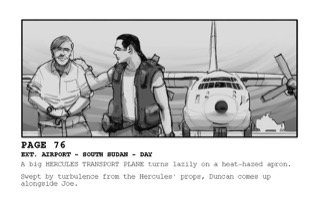
Even though Briggs felt he was done with the world of the Immortals, the franchise wasn't done with him yet. Flashforward ten years (and two 'Highlander' movies and two TV series) later, Briggs was again asked by Bob Weinstein and his people at Miramax if he would meet with Bill Panzer and Peter Davis.
"At this point, the franchise was with Miramax/Dimension over at Disney. They were running the show with Panzer and Davis as an adjunct. I knew Miramax were fans of my work, and so an impish little part of me was thrilled at the prospect of coming back after a decade and tackling Bill Panzer about what had previously gone down," Briggs recounted mischievously. So I had a conference call with Bill Panzer and Peter Davis. I knew from various interviews over the years Peter Davis acted as the business side of the operation, and Bill was the "creative" side of the equation. Peter was only on for a very short period, and after he'd ducked off the call, I gleefully started needling Bill playfully about the what had happened on the show after our ten-year-ago call. It amused me that he got very evasive and quite nervous about it all. Once Miramax had inked the contract, there wasn't much in the way of guidance from Bill Panzer himself. There was some existing material, several drafts by different writers. There was a draft before me, I think, by Joel Soisson, that I gather now is a little infamous in Highlander fan circles, being a strange post-apocalyptic thing with a morose Duncan wandering like Mad Max in the wastelands along with a pet monkey called Connor. But the gist of these varied drafts by other writers was similar, and Panzer/Davis wanted 'the same, but different'. Panzer seemed happy with the overarching notion, which was the Immortals looking for 'The Source' of their Immortality, supposedly where they may have sprang from. Mostly, their stipulation was that they wanted it to be 'epic'. That word was actually used: 'epic'. I figured if they were going to be throwing words like that around, they probably had the budget to back it up. I was a little hesitant at first. I felt it was a bad move to really sort of definitively say, 'This is where Immortals were created' it's analogous to saying, in 'Highlander 2', that they come from the planet Zeist. You tend to rob the story of its mystery. But, by the same token, you have to tell a story, and extend out from the show, and build on the franchise to create something that's new and not regurgitating old material. It's not just "decapitation of the week". You had to add to the lore in a meaningful way."
In an attempt to plug himself back into the 'Highlander' universe, Briggs set out to learn the current state of play of the franchise.
"I'd seen a couple of the episodes of the show after my brother's meltdown, but I hadn't really followed it very much after that. A friend of mine in Nevada, Rene Averett, was a big fan and sent me a VHS copy of the entire series run - you have to remember that, even though this was 2002/2003, there wasn't much in the way of anything you get on the Internet those days - so a lot of the research was kind of you looking at old magazine articles and cobbling together a whole history and timeline of the series to build on it," he said.
Adding to the challenge was that the 'Highlander' franchise continuity did not offer a rock-solid foundation.
"Taken in its entirety, (the franchise continuity as a whole) really doesn't make any sense," Briggs said.
"You've the first film where Connor gets the Prize, and then the second where suddenly he's an alien, which is all a headscratcher. That third film with General Katana (Mario van Peebles, seemingly riffing on Clancy Brown's performance as the Kurgan from the first film) tries to explain it away by saying Katana's been buried underground, so the Prize didn't really happen, even though we'd already seen that. It's all really tenuous logic and really just an excuse to remake the first film. Then you go into the series, and it's like, 'There Can Be Only One - except there isn't, because there's actually lots of them'. It's a very tenuous continuity that really doesn't hold any kind of water. The different aspects of the franchise are all like weird streaming-off branches that hold not-much internal logic.”
To help get a sense of what fans were after, Briggs started snooping around online 'Highlander' fan groups.
"My handle on one of the main sites was 'Everpresent Scribe', and I was gently probing… asking what people were expecting from the movie, what they'd like to see," he said.
"I was incognito, not even hinting that I was the writer of the film; I was just trying to figure out what the fans wanted because I think it's good to have fan service. Those interactions helped me understand the clear fan favourites. There was the character of Joe, for instance, that didn't exist in the previous Miramax theatrical drafts. Methos certainly was the major fan favourite, and that was one I liked too, so I was adamant in wanting to keep him in there. My aim was to try tie as much of the disparate continuity together so that things finally started cohesively making sense again. One of the things I wanted to do was have Ramirez (Sean Connery's character) in the mix, and you see him in my drafts - at least, we depicted his character in a couple of fast library material cuts and then showing him in scenes with the back of his head because it was obvious that with the best will in the world, you weren't going to be getting Sean Connery to reprise that role. There were references to the Kurgan in there. I wanted to bring back Lisa Barbuscia, who played Kate (Duncan's wife) in 'Endgame'. I also wanted to have Duncan living at Connor's old forge that we see in 'Highlander Three'."
The story, as expanded on by Briggs, centred on a group of Immortals (including Methos and Kate, who Briggs added to the mix this time) in pursuit of an artifact known as The Source, supposedly connected to a mythical, ancient mechanism that may or may not be the wellspring of the Immortals.
"The Source Machine was something that (the previous writer, Joel) Soisson had come up with," Briggs said.
“Joel had this conceit that I thought was amusing, that you see this thing that looks really huge, but like that Terry Gilliam-type lens perspective effect you see in his movie "Brazil", where suddenly this guy looms over a giant power plant stack, and you realise it's only a tiny little model. And when you see the machine in this, it's this big grinding edifice that's powering up every time an Immortal quickening happens, but when you see it in real life, you realise it's about three feet tall. So that conceit was still in there.”
But the Immortals are not alone - someone else is also looking for The Source, a different kind of Immortal. A seemingly all-powerful, unstoppable Immortal who cannot be killed and, when decapitated, transfers into its killer's body via the Quickening.
"That body-hopping bad guy was again something from the Soisson draft that I was encouraged to keep. It was a bit like that Denzel Washington movie 'Fallen'," he said.
"And then the dilemma I had with that was: what do you do to kill that character? It was like the central plot flaw with what they did with the Emperor in 'The Rise Of Skywalker'."
For Briggs, the fix was easy - and came in the form of a character called Jason, a rogue Watcher who tags along with the Immortals with his agenda. In the story, he's prematurely ageing thanks to a rare disease and hopes The Source can cure him.
"If the Boss Bad Guy is transmitted via the Quickening from one Immortal to another, the simple answer to that equation was you have somebody who's not Immortal - a regular mortal human being - kill him," he said.
"That way, there is no transmission through the Quickening and the Big Bad is killed."
(In a nod to the original film, after killing the bad guy, Jason in the script wistfully muses, 'Who wants to live forever?' before dying.)
Briggs also left the door open for a new series of entries in the 'Highlander' franchise, with questions remaining about the separate tribe of Immortals, which could be fertile ground to explore should the series continue.
"Bill Panzer said they wanted to reinvigorate the franchise, so we wanted to keep things open," Briggs added.
"I treated it that the Bad-Guy strain of Immortals in the story were only an offshoot of the Immortals we knew. They most likely sprang from the same point in their evolution, but they definitely weren't the same. They were two disparate things. For future entries, you could pretty much forget about that strand or go back to it. My intent was that it was a detour, but it wouldn't be a Planet Zeist piece of nonsense.”
In keeping with the Panzer/Davis' epic' directive, Briggs crammed his draft with an array of set pieces, including a daring heist and multiple grand-scale fight sequences.
"I tried to open it up a bit… there were no flashbacks really in the previous Miramax drafts to mine, which is odd, because when you think of 'Highlander', you immediately think of those terrific visual linkages that Russell Mulcahy did in the original. Or, at least, I did!" Briggs said.
"I expanded out the story with setpieces… there was a car chase through a Moroccan souk; there were flashbacks to things in different time periods, Duncan's past, things from Connor's past - including that Ramirez cameo - a search through the Nile, big action sequences. Weirdly enough, I remember at the time Bill Panzer asked me if Roger Daltrey's character Hugh ((LINK https://en.wikipedia.org/wiki/Hugh_Fitzcairn))- who had a recurring role in the show - could be in it. And it wasn't until I'd actually finished the script that I suddenly remembered Roger Daltrey! I had completely, totally forgotten about him and cursed myself for it."
The absence of Daltrey's character didn't fuss Panzer and Davis, but the element they did seek to change took Briggs entirely by surprise.
"The first comment that I got from Bill Panzer when he read the first draft was that it was 'TOO epic'," he said.
"I replied indignantly, 'But you wanted epic?' And Panzer said, 'Yeah, but we only have… 'I can't remember what he quoted as a money figure for the budget, but it was a staggeringly low budget. I mean, If you go back through the whole history of 'Highlander', even back to the first movie, Panzer and Davis were notoriously cheap as producers. There was almost a riot on the Scottish set when they decided that they were not going to be feeding the actors, and all the extras went on strike for like a day. Panzer and Davis, these were guys who had been basically cutting a corner and milking a franchise as their own personal money pit for the best part of 20, 30 years. I was mystified and annoyed by this. Why would you tell somebody to be 'epic' if you have no money to make 'epic'? This is, I think, the history of the Highlander franchise all over… it's straining to be something that the producers can't afford to make. I mean, how do you get people excited if you've only got three bucks change and a couple of cereal box tops to spend on the thing? You just can't. At the time I took on the assignment from Miramax, I had been making a concerted career effort to pivot into directing, and I agreed to come on this project with the proviso that if the drafts worked out that I'd be given some thought as to being able to direct the movie. So I was slightly exasperated when I heard how low the budget was going to be because I assumed that - being Dimension - they might at least have the same sort of mid-20 million range of money that they were throwing at the 'Scream' franchise or 'Mimic' or any of those things. And it transpired that it was far, far lower than that."
In keeping with the revised Panzer/Davis "epic...but not" directive, Briggs set about stripping down the action scenes and beefing up the characters, with an added focus on the Kate/Duncan relationship. One of the main budgetary casualties in the rewrites, Briggs said, was the presence of the Watchers.
"They had been much more proactive in the early drafts, and Bill Panzer said, 'We can't really afford to do these big Watcher action sequences'… so all that was cut, really pruned right back to the point where we just had that secondary role in the Jason character, who tags along and becomes the hero in the end," he said.
"I've had studio notes on projects that are extensive to the point of ridiculousness, but this was the opposite - it (Panzer/Davis' feedback) was ill-defined and very vague and disappointing. I was trying to make reference to things that had existed within the TV show, but I got a sense that the producers just really creatively were not that bothered.”
With two more revised drafts submitted, Briggs' involvement with 'Highlander' ended abruptly.
"I've been on a lot of these things over the years; I've been in situations where I'm told that my service is no longer required on a project," he said.
"Sometimes your agent calls you up and tells you the bad news, very occasionally, you get a sweet letter or an email from a producer saying 'We really appreciate you, but…', and then sometimes there's a thudding silence, and you read in the trades that somebody else is on the project instead of you. This one was much simpler and weirder because Miramax/Dimension as a company folded. The studio died. Disney terminated their overall deal with Miramax, and so that was the end of both my involvement and the end of Miramax. Until the project subsequently jumped over to Lionsgate after Panzer and Davis shopped it around. Nobody got in touch with me. I heard they were going ahead with the film, and I guessed at some point that there would be a Writers Guild Credits Arbitration. So the film got made, the arbitration came up, and I was sent the shooting draft by the Writers Guild. And the process is you write a formal document in which you analyse what there is of your material that's ended up in the final film, and then you submit it back to the Guild who, has an anonymous panel of your peers review the statements and the materials, and then they tell you who is going to get their name in the credits and in what capacity. And if you want to make money in this business, you need to have contributed a certain percentage of that material in order to get a credit, and if you don't get a credit, you don't get the money coming in through residuals from theatrical sales and streaming and Blu-ray, and all those things. And so I remember reading that shooting draft to prepare my statement, and I was so horrified by how bad the script was; my statement to the Writers Guild was if they decided that any portion of my material still existed in this film, I would not be seeking a credit. I just didn't want my name attached to that turkey. It was slightly shocking. The film came out and was horrible. It was badly directed, looked like it was shot on toilet paper, and it really was quite an awful film."
For Briggs, after years of being involved with the classic franchise, he reluctantly accepted an old truth about the 'Highlander' series.
"There's that old joke about the series… and I know that people love the TV show, and I was always being respectful to the TV show, but...there really "Can Be Only One," Briggs laughed.
"There's episodes of the show I really liked, but the first Widen-Ferguson-Bellwood written Mulcahy movie stands alone. The producers really treated the whole franchise as a cash grab. In a call once, Bill Panzer said to me, 'I need to make these movies because I've got to pay somebody to clean my swimming pool'. That, in a nutshell, for me defines Bill Panzer and his relationship to the 'Highlander' franchise. If you read the drafts that I wrote, and then you look at the thing that was made, there's no comparison. And I don't feel bitter - I feel pretty good about it because I really did not want to be associated with that final product. "
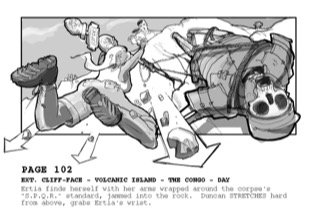
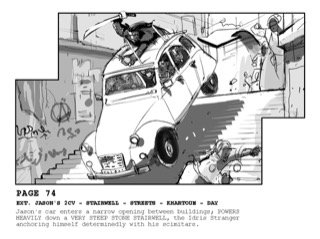
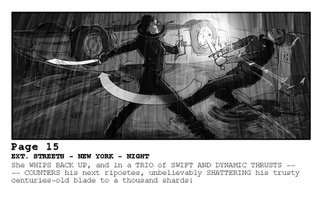
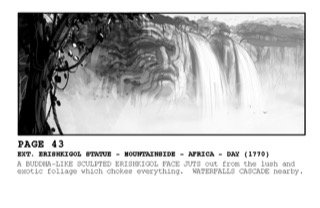
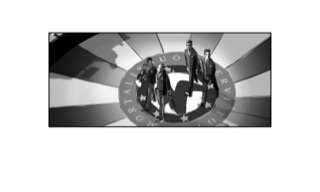
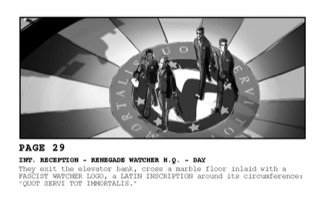
Anotherfilmnerd's earliest cinematic memory was seeing Don Johnson throw up all over a suspect in John Frankenheimer's 'Dead Bang'. Ever since, he's devoted his life to searching out cinema that's weird, wonderful and features vomit in the most unlikely of places.